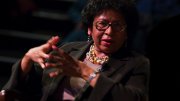This morning, Harvard announced that Ruth Simmons, Ph.D. ’73, LL.D. ’02,will join the University as senior adviser to the president on engagement with Historically Black Colleges and Universities (HBCUs). Set to begin June 1, her role will focus on efforts to fulfill the recommendations laid out in a 134-page report, released last year by a Presidential Committee on Harvard and the Legacy of Slavery. Among other actions, the committee called on Harvard to “develop enduring partnerships with HBCUs”—and suggested doing so through “the expansion of existing collaborations” with “research-focused HBCUs” and by creating and subsidizing summer, semester, or yearlong exchange visits for HBCU and Harvard faculty members and students.
Simmons’s experience in this area is considerable. As an undergraduate, she attended the historically black Dillard University in New Orleans, before coming to Harvard for her doctorate in Romance languages and literatures. Decades later, as president of Brown in the early 2000s, she launched an investigation into that university’s historical connections to slavery—the first inquiry of its kind. The Brown University Steering Committee on Slavery and Justice, which Simmons commissioned almost immediately after arriving on campus, produced a landmark report in 2006 that became a model for dozens of other institutions—including Harvard—that have since begun examining their own histories of enmeshment with slavery.
During a conference at the Radcliffe Institute last spring following the release of Harvard’s report, Simmons recalled the momentous struggle in those early days at Brown to uncover a history that had been “erased from books completely.” She spoke, too, about the continuing importance of discovering and wrestling with this history at institutions like Harvard. “While the subject of equality and justice remains deeply important for descendants of slaves, it’s actually just as important to every American,” she said. “The prospects for a unified and peaceably governed nation will forever elude us if we do not address this legacy and its continuing impact on the lives of so many, so very many, in our country.”
Since 2017, Simmons has served as president of Prairie View A&M University, an HBCU near Houston, Texas. (Last summer she announced plans to step down from that position at the end of this school year; two weeks ago, she said she would depart at the end of February, four months earlier than expected. She explained in a letter to the Prairie View A&M campus community that her abrupt exit came after being informed recently that her presidential authority would be “limited” for the rest of her term.) In a virtual address given at Harvard’s 2021 graduation, Simmons connected her new campus to this University in stark terms, saying:
I call on universities like Harvard to acknowledge the limitations imposed on these institutions over the past decades. While universities like Harvard had the wind at their back, flourishing from endowments, strong enrollments, constant curricular expansion, massive infrastructure improvements, and significant endowment growth, HBCUs often had gale force winds impeding their development. Our nation is finally coming to terms with the consequences of the underfunding of HBCUs but we are far from where we need to be if we are to be assured continued progress in the fight for equal educational benefits.
I ask the university that did so much for me to add to its luster by embracing the opportunity to stand alongside these historic and other minority serving institutions to build stronger partnerships, advocate for greater funding, and elevate the fight for parity and justice to the level it deserves. Let us not complain in a hundred years that those historically excluded from access and opportunity continue to ask how much longer it will take to gain the respect, inclusion and support that their service to the nation deserves.
During last year’s conference at Radcliffe, Fletcher University Professor Henry Louis Gates Jr. asked her about the place of HBCUs in American education and what “gestures and programs” from Harvard might be most meaningful. Her answer called for better recognition from universities like this one, and better funding. “Invite us into the community of scholarship,” Simmons said, speaking of HBCUs. “Invite us into the community of research and allow those partnerships to lift these institutions in ways that they never really had a chance to be lifted.”
The University announced in a news release that Simmons will convene a gathering of HBCUs in Cambridge this fall, for which plans will be announced in the coming months. She will also advise on the development and growth of partnerships, including faculty and student exchanges between Harvard and HBCUs. Her efforts will focus on what the news release called “direct outcomes and opportunities through these partnerships,” as well as on establishing a set of best practices for this work.
Simmons’s arrival is the latest announcement regarding Harvard’s efforts to begin implementing the recommendations outlined in the University’s report on slavery. Last week, newly appointed Vice Provost Sara Bleich spoke with Harvard Magazine about other developments currently under way. The University pledged $100 million last year to fund implementation of the report’s recommendations.
At 2 p.m. Eastern time today, Simmons will sit down with President Lawrence S. Bacow for a conversation on higher education, during which Bacow will formally announce her appointment and provide further details. The conversation is taking place on Prairie’s campus and will be livestreamed on YouTube.
Updated February 27, 2023, 8 p.m.:
During an hourlong conversation at Prairie View A&M, Simmons and Bacow reflected on their decades in higher education, and at the helm of several institutions. The two have known each other as colleagues and friends for more than 20 years, and both are now on the cusp of departing their current jobs: Simmons is resigning as Prairie View’s president this week, and Bacow will retire from Harvard in June (so Simmons will advise his successor, president-elect Claudine Gay). Amid their discussion of presidential priorities, early-life moral influences, and the challenges facing educational institutions in the current political climate, Simmons and Bacow spoke of the path ahead for Harvard in implementing the recommendations in the report on slavery, and of her new role in that work.
In introductory remarks at the start of the event, Sara Bleich, the new vice provost for special projects, had said of Simmons, “There is no leader in higher education whom Harvard can learn more from” in pursuing partnerships with HBCUs. Bacow offered a similar assessment, noting the “direct role” that Simmons, as president of Brown, had played in inspiring Harvard’s later self-investigation. “She really plowed new ground,” he said. “And she set an example for all of us. For some of us, it’s taken decades to follow that example. But it’s never too late to do what’s right.”
Anticipating her new position at the University, Simmons talked about “how much Harvard can do for places like Prairie View.” Then, she recited a passage from the report’s recommendation regarding HBCUs, which she said she’d re-read and underlined earlier in the day: “‘As a result of the nation’s history of separate and unequal systems of education,’” she read, “’HBCUs have often been underfunded and excluded from the benefits that many other universities enjoy. In spite of this long-standing disparity in treatment, Harvard, like other major universities, has greatly benefitted from the enrollment of HBCU alumni in its graduate and professional programs. These students have added immeasurably to the quality of education afforded all students at Harvard and have expanded knowledge and understanding in many disciplines.’”
Then, looking up from the page, she said: “This is the moment for HBCUs to receive their fair share.”
Updated March 8, 2023, 10:20 A.M.:
Today the HBCU Library Alliance and Harvard Library announced a joint partnership aimed at digitizing and preserving African American history collections in HBCU libraries and archives. The project will bolster the digital library hosted by the Atlanta University Center Robert W. Woodruff Library, which serves the oldest consortium of HBCUs: Clark Atlanta University, the Interdenominational Theological Center, Morehouse College, and Spelman College. The new partnership will scale up and strengthen the library’s digital capacity, extending training, resources, and services; once photos and documents are digitized, public access to finding aids and collections will be available through the HBCU Library Alliance digital library portal. The project is funded by $6 million provided by the Harvard and the Legacy of Slavery initiative. “The HBCU libraries have deep connections to African American history and expertise in records that are incredibly important,” said Harvard Vice President for the Library and University Librarian Martha Whitehead in a press release accompanying the announcement. “This partnership will open and preserve access to many significant research collections held in HBCU libraries, while ensuring they retain ownership of the collections.” The project will begin in 2023 and is expected to span four years.









